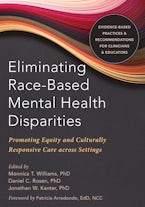By Monnica T. Williams, PhD, ABPP, coauthor of Eliminating Race-Based Mental Health Disparities
As mental health clinicians, we want to provide fair and equitable care to everyone, across race, ethnicity, and culture. Nonetheless, race-based mental health disparities stubbornly persist, and at a much larger scale than most of us realize. As a field, clinicians are overwhelmingly White, well-educated, and advantaged. We also know, for example, that most White people in the United States vastly underestimate the continued extent and impact of racism on people of color. And research shows that despite our best intentions, we exhibit bias at the expense of our clients, even when we are trying not to.
Learning what to do about this is not easy. When I was a clinical psychology graduate student, there was little in the way of formal didactics to help us learn how to work with clients across these differences. There were no courses offered in my department to train us, and students were actively discouraged from taking courses in the school of education, the only place where one might find a graduate course focused on multicultural counseling. The clinical faculty thought they knew enough to adequately prepare us to become clinicians and researchers, but you can’t give what you never received. These faculty who were never trained in diversity issues could not give us the tools we needed to do this work effectively.
My early efforts at trying to teach multicultural psychology exemplify the problem. When I was asked by my chair to teach undergraduate multicultural psychology, I thought nothing of it. I would simply apply the framework I had used successfully to teach abnormal psychology: Work through the textbook, present interesting facts, and ask the students to write papers. But it didn’t work. The students became angry and disengaged. Several wrote abusive comments in their course evaluations. I wondered if I should stop teaching about race altogether, and go back to the comfort and familiarity of abnormal psychology.
I learned the hard way that this material cannot be simply taught with facts and figures. As we strive to facilitate growth and learning, we are also bumping up against unconscious biases, cultural traditions, stigmas, and lessons engrained from an early age. Further, what students need may change rapidly, rendering our previous learning out-of-date. Many professors attempting to teach these topics have ended up with classrooms that have spun out of control, with students angry, crying, or disengaged. We have learned that emotional engagement is important to this learning, but emotional dysregulation and its counterpoint, suppression, are toxic to the process.
The good news is that it is possible to both effectively learn and teach this material. I have taken my many years of experience as a diversity educator—including my mistakes and pitfalls—and assembled this volume to help guide the way for emerging clinicians. This book is the book I wish I had earlier in my career, as I aspired to become a clinician, educator, and researcher. It reflects how we as a society have grappled with important questions around race that our field and our training have left us unprepared to answer. Published in 2019, this collection is situated in an important moment in time when the work is harder than it has been in many years.
The first problem addressed by this book is simply delineating the scope of the problem as it exists today, across multiple settings in which mental health practitioners work. The book is composed of three distinct sections. The first section is called Creating Context: Understanding Disparities, which delves into the state of racial disparities in mental health care and the science that allows us to understand these issues. The second section of the book is called Best Practices in Training and Psychotherapy, which offers hands-on, practical approaches for educators and clinicians. The third section of the book is called Structural Mental Health Disparities, which takes a broader look at problems across multiple domains, including academia and various mental health settings.
And for those of you who are teaching this topic, this book is for you. We included PowerPoint slides for each chapter to help make life a bit easier for busy professors. The book even includes a chapter on how to teach about race and racism to clinicians—one of the most challenging topics there is.
Overall, this book represents the tremendous effort of our contributors, who range from the most senior and respected scholars in the field to new graduate students with fresh perspectives on diversity issues. The spate of excellent authors who have brought this book to life is truly humbling. In developing this volume, we pushed ourselves and our authors into new ground to ensure the work is both timely and timeless, fearless in its representation of the problems we as a society face, creative in its proposed solutions, anchored in evidence and theory, and pragmatic for immediate uptake and utility. I truly believe we have succeeded in creating the book we desired early in our careers, and I hope it will inspire current graduate students, clinicians, and researchers in their classrooms, organizations, clinics, and communities.
Monnica T. Williams, PhD, ABPP, is a board-certified clinical psychologist and associate professor at the University of Ottawa in the school of psychology, where she holds the Canadian Research Chair for Mental Health Disparities. She received her master’s and doctoral degrees from the University of Virginia, where she conducted research in the areas of major mental illness, tests and measurement, and ethnic differences. She has started clinics in Virginia, Pennsylvania, and Connecticut, and a refugee mental health clinic in Kentucky. Her clinical work and research focus on African American mental health, culture, trauma, and obsessive-compulsive disorder (OCD).



 Part 2: What to Do When a Client Is Participating in Self-Judgment?
Part 2: What to Do When a Client Is Participating in Self-Judgment?